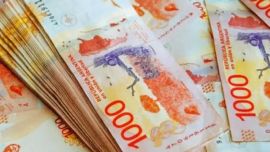Jean-Claude Juncker put his finger on a problem that is faced by all the many democratic politicians who, after climbing to the top of the greasy pole, find themselves trying to keep a leaky economy afloat when he said: “We all know what to do, we just don’t know how to get reelected after we’ve done it.”
Halfway through last year, Mauricio Macri would surely have agreed with the bibulous head of the European Commission, but as time went by, he changed his mind. Strange as the idea may seem, he came to the conclusion that after having gone through so much and seeing on their television screen what is happening in Venezuela, Argentines could be as stoically realistic as Germans and, perhaps, would not be as obstructive as the French when it comes to putting up with unpleasant economic reforms.
Though Macri’s popularity plummeted along with the peso, to his evident relief it remained high enough for him to resume dreaming about winning the forthcoming presidential elections despite the fact that much of the population had suddenly lost a big chunk of the purchasing-power it had grown accustomed to. Sceptics think his aides are being overoptimistic when they say everything will be over by the end of October so there will be no need for a run-off, but nobody is laughing.
A numbers man, Macri is well aware that Argentina has lived beyond her means for far too long and is convinced that unless she changes her ways very quickly, she could share the gruesome fate that has befallen Venezuela. If enough people suspect he is right, the humanitarian catastrophe that is emptying that unhappy country should be enough either to keep him in office for another term or, at the very least, to ensure that the man or woman who replaces him has similar views.
Perhaps it will be. For Macri’s Kirchnerite foes, the prospect of Argentina morphing into Venezuela may look wonderfully inviting, but after giving a thought to what it would mean for them personally, many who in other circumstances would enjoy giving an allegedly right-wing government a kick in the teeth are coming round to the idea that it would be better to let it continue in power for a while longer.
Though to the surprise of many the last few weeks have seen the peso harden a bit and there are hopes that, under Jair Bolsonaro, Brazil will leave a long recession behind, thereby giving the Argentine economy a muchneeded lift, nobody thinks the coming months will be easy for Macri. Much could go wrong. After all, the millions of individuals who have grown accustomed to living off meagre handouts in exchange for nothing much are unlikely to take kindly to seeing them reduced still further, but with money running out, the little they still get could be too much for an economy that is undergoing a slump.
Macri and his supporters fear that even if slum-dwellers do not go on a looting rampage, as many, egged on by ambitious politicians, did back in late 2001 when they forced Fernando de la Rúa to call it quits, they would be almost certain to vote for anyone who promised to continue giving them what they feel they deserve. However, if the opinion polls are to be believed, there are plenty of people who live below the poverty line who are still willing to give Macri’s government the benefit of the doubt.
Argentina and Venezuela have one very important thing in common. Both countries have been greatly harmed by the conviction that, thanks to a benevolent deity, they are naturally rich. This belief has given generations of politicians an excuse to make out that everybody would be able to live in a fair degree of comfort were it not for the cruelty or incompetence of the government of the day. As commentators keep reminding us, Venezuela sits on what may well be the world’s biggest petroleum reserves, a stroke of luck that was supposed to mean that all the people in charge would have to do was spend the proceeds.
Long before Hugo Chávez arrived on the scene, this was precisely what a long succession of governments, some democratic, some not, did. They assumed that development was not the result of the collective efforts of most individuals but something you could import, so they used the money that came gushing in to buy consumer goods and foodstuffs that allowed them to shore up the standard of living of millions of barely employable semi-literates.
Chávez took all this to an entirely new level. The “21st century socialism” he claimed to have invented depended entirely on the availability of easy oil money. When the price of a barrel of crude failed to scale new heights as he and his friends had expected, but instead fell as fracking got underway in the US, the ramshackle edifice they had constructed came crashing to the ground, with devastating consequences for all those squatting in it. Luckily for Argentina, the wealth she once enjoyed was derived from rather more than the ability to make foreigners pay though the nose for the privilege of exploiting her abundant natural resources. Since the middle of the 19th century, the country has possessed a smallish but lively entrepreneurial class supplemented by hard-working farmers who, unlike their Venezuelan counterparts, have always been able to produce enough food for the rest of the population and to sell abroad.
Even so, as more and more politicians decided that it would be in their interest to make the most of the illusion that great wealth was there for the taking by going on about the need to stop worrying about efficiency, to their mind a nasty right-wing obsession, and instead limit themselves to sharing out what was already there in a more equitable fashion, they set in motion a process that would end up by impoverishing millions of people who found their proposals all too persuasive.
This illusion should have died in late 2001, when the country defaulted, but it was given a new lease of life by the worldwide commodity boom that was set off by China and survived, after a fashion, until last April, when Macri, who for over two years had kidded himself that nothing much had changed, decided that unless he got serious the Argentine economy would end up like Venezuela’s.




















Comments